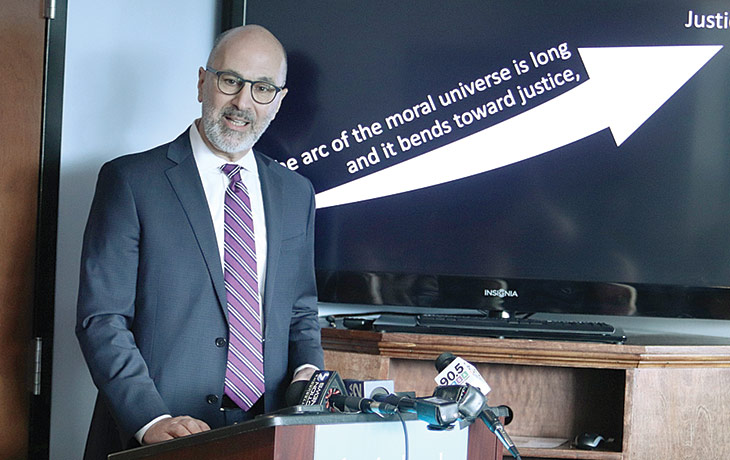by Rob Taylor Jr., Courier Staff Writer
Perry Traditional Academy and Pittsburgh Milliones 6-12 (also known as University Prep) have some of the highest percentages of African American students at the high school level in the Pittsburgh Public Schools district.
They’re also, along with Pittsburgh Westinghouse 6-12, the district high schools with the lowest percentage of students utilizing the Pittsburgh Promise scholarships.
“It’s absolutely alarming,” Promise Executive Director Saleem Ghubril told the New Pittsburgh Courier exclusively, Jan. 29, about the data.
The low percentages are a vital component as to the reason the Promise announced the formation of “Promise Coaches,” a group of professionals whose task is to help students get on the track to becoming eligible for Promise scholarships.

The initiative was made possible by a $2 million investment to the Promise from the Richard King Mellon Foundation.
Beginning next school year, four coaches will be assigned to work inside Carrick High School, and two coaches each to work inside Perry and Milliones. Ghubril told the Courier that the organization wanted to track the effectiveness of the program in Carrick, Perry and Milliones first before expanding it to Westinghouse.
In 2018, just 18 percent of Milliones’ high school graduates used their Promise scholarship; at Perry, it was 11 percent. Carrick’s percentage was 38 percent.
Compare that with the schools that have the highest Promise scholarship usage rates, like CAPA and Sci-Tech, which hover around 70 percent, Ghubril told the Courier, with Allderdice and Pittsburgh Obama not far behind.
Over the next four years of the Promise Coaches program, Ghubril hopes the percentages at Carrick jump by two-thirds to 62 percent, double to 36 percent at Milliones, and triple to 33 percent at Perry.
“Our data tell us that the Promise usage rates in certain high schools is very low,” Ghubril said at a Jan. 29 news conference in the Hill District, “and our study of best practices across the country show that investment in coaching at the high school level and in certain colleges ends up transforming that outcome.”
Ghubril said that while the Carrick percentage of 38 isn’t anywhere as low as Perry and Milliones, there’s a growing student immigrant population at Carrick which, he feels, can be better served with Promise Coaches.
The coaches, to be hired by the Promise and begin a three-month training process in June, will focus on five areas while at the three high schools: Help students determine their interests and skills; determine the resources (including financial) available to the students; determine the best options available to the students post-high school (four- or two-year institution, trade or technical school, military, entrepreneurship); keep students abreast on what’s happening professionally in the Pittsburgh region’s marketplace; and help students develop professional skills that can be used in the workplace.
The coaches will serve all students beginning in the ninth grade or earlier at the three schools, with an emphasis on those who are below, or at risk of falling below, Promise eligibility. To be eligible for the Promise scholarship, PPS students must have at least a 2.5 GPA and have an attendance rate of at least 90 percent. They must also have been enrolled at a Pittsburgh Public School or one of its select charter schools, continuously, since the ninth grade.
Students who have been enrolled in a Pittsburgh Public School since Day 1 of the ninth grade and who have met the academic and attendance requirements are eligible for up to $20,000 in college scholarships from the Promise. To utilize the scholarship, students must attend a post-secondary school in Pennsylvania.
Ghubril said it’s important that the coaches are familiar with the culture of the students and schools served. He said that during the selection process of the coaches, preference will be given to those with a bachelor’s degree, who are PPS graduates and also received a Promise scholarship.
“They know the system, they know the city,” and they know the culture, Ghubril said. “To me, that is the ideal candidate.”
To provide ongoing intensive support to the coaching cohort, the Community College of Allegheny County and Carlow University combined were awarded $1.9 million by the Richard King Mellon Foundation.
Ghubril applauded both Carlow and CCAC for their continued partnership with a number of Promise students being enrolled in those schools over the years.
“We are thankful that the missions of CCAC and Carlow University compel them to take risks on students that other institutions may not,” Ghubril said in a statement provided to the Courier. “This new partnership will deepen our collective work and widen the pathways to opportunity before our students.”
The Promise hired Amy Yearwood as the Promise’s new director of college and career success. She will head the Promise Coaches initiative.
“When the Promise approached us with this idea, it was an immediate and easy ‘yes,’” Pittsburgh Public Schools Superintendent Anthony Hamlet, Ed.D., said at the Jan. 29 news conference. “For one, this provides ample opportunities for our students, but also we want to make sure we are able to access students who normally don’t have the supports in place, but also need additional support. It’s what we call equity.”
(ABOUT THE TOP PHOTO: SALEEM GHUBRIL, executive director of The Pittsburgh Promise. Photo by J.L. Martello)